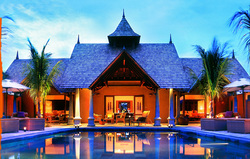Ways Tourist Operators are Currently Minimising Impacts
The government in the Maldives is currently
making an effort to ensure the Maldives is sustainable and kept for future
generations. Some of these ideas include that for every island that is
developed as a resort, one other must be left as a reserve and that only 20% of
the total land area can be built up. Resort buildings are only allowed to be 2
stories but only if vegetation hides the higher levels, this is more of an
aesthetic regulation. To ensure that overcrowding does not occur each tourist
must have 5 linear meters of beach allocated to them, and only 68% of the beach
can be allocated to rooms, 20% has to be for public use and 12% must be left as
open space.
Individual tourist operators are also making an effort to minimise environmental impacts and the Taj Exotica Resort & Spa on the Emboodhu Finolhu Island is an example of this. The Taj Exotica Resort is increasing the recycling of metals and plastics, introduce a rain water collection system that will collect 896,000 litres per year. They also expect to save 109,500 litres of diesel every year with their hot water system that reduces the use of electricity and diesel. Lastly, they are only planting native tree species such as the Jade Tree, Sea Hibiscus and the Malikuruva Rose so that no additional watering is required, saving 10,000 litres of water per day.
Another example of a tourist operator currently trying to minimise their environmental impacts is the Soneva Gili resort, which also recently won the ‘Wild Asia’s 2010 Responsible Tourism Award’. The resort has a strong commitment to the environment and also workers’ welfare as it guarantees good quality staff conditions and extensive training in environmental management for all employees. They also benefit society because 5% of their annual revenue goes into a ‘Social and Environmental Responsibility Fund’ that benefits the local and international programmes on health, education, conservation and community development.
All the villas and other buildings in the resort are crafted from renewable and certified – sustainable sources. Rubbish is a massive problem in the Maldives and the Soneva Gili resort is doing their part by creating a desalinisation plant to treat all the water for the operation and therefore requiring no plastic bottles to be imported to the island. They also collect the exhaust heat from the generators to heat water for the entire resort. They minimise air miles and non-biodegradable packaging by having their own organic gardens and sourcing from local farms and fishermen.
Individual tourist operators are also making an effort to minimise environmental impacts and the Taj Exotica Resort & Spa on the Emboodhu Finolhu Island is an example of this. The Taj Exotica Resort is increasing the recycling of metals and plastics, introduce a rain water collection system that will collect 896,000 litres per year. They also expect to save 109,500 litres of diesel every year with their hot water system that reduces the use of electricity and diesel. Lastly, they are only planting native tree species such as the Jade Tree, Sea Hibiscus and the Malikuruva Rose so that no additional watering is required, saving 10,000 litres of water per day.
Another example of a tourist operator currently trying to minimise their environmental impacts is the Soneva Gili resort, which also recently won the ‘Wild Asia’s 2010 Responsible Tourism Award’. The resort has a strong commitment to the environment and also workers’ welfare as it guarantees good quality staff conditions and extensive training in environmental management for all employees. They also benefit society because 5% of their annual revenue goes into a ‘Social and Environmental Responsibility Fund’ that benefits the local and international programmes on health, education, conservation and community development.
All the villas and other buildings in the resort are crafted from renewable and certified – sustainable sources. Rubbish is a massive problem in the Maldives and the Soneva Gili resort is doing their part by creating a desalinisation plant to treat all the water for the operation and therefore requiring no plastic bottles to be imported to the island. They also collect the exhaust heat from the generators to heat water for the entire resort. They minimise air miles and non-biodegradable packaging by having their own organic gardens and sourcing from local farms and fishermen.


